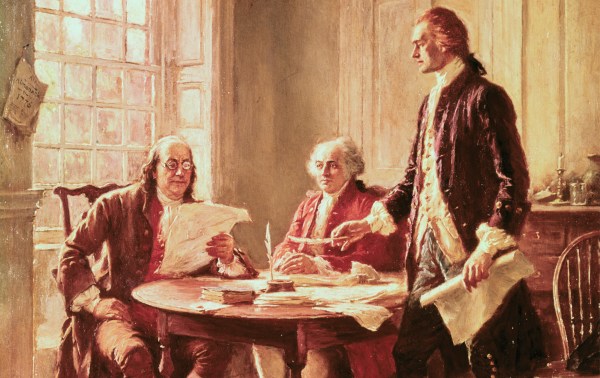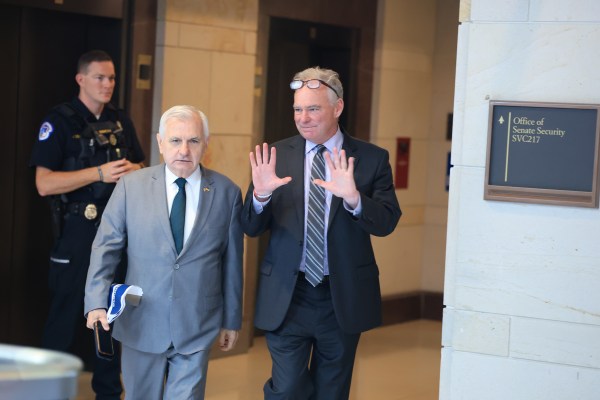You are currently on our free list—meaning this is just a preview of the newsletter. To access the full version and unlock all our reporting, join The Dispatch.
Happy Monday! Following a very public (and at times, very messy) falling out with President Donald Trump, Elon Musk on Saturday announced plans to form his own political party. Surely this is exactly what the 60 percent of Americans who are dissatisfied with both the Democratic and Republican parties had in mind.
Quick Hits: Today’s Top Stories
- President Donald Trump signed the One Big Beautiful Bill Act into law on Friday, marking the first major legislative action of his second term. The sweeping package includes tax cuts, increased funding for border security and immigration enforcement, and $150 billion in additional defense spending. It also introduces work requirements for the Supplemental Nutrition Assistance Program (SNAP), reduces federal spending on social safety net programs such as Medicaid, eliminates clean energy tax credits and electric vehicle subsidies, and raises the debt ceiling by an estimated $5 trillion. The House approved the bill by a vote of 218-214 on Thursday, after GOP leadership and Trump lobbied Republican holdouts to flip their votes ahead of the president’s July 4 deadline to pass the measure.
- Flash flooding battered central Texas on Friday and into the weekend, killing at least 82 people, including 28 children, with dozens still missing as of Monday morning. Among the confirmed deaths are 10 young girls and one counselor at Camp Mystic, a Christian summer camp on the banks of the Guadalupe River. According to local officials, the river surged 26 feet in just 45 minutes on Friday morning, catching residents and campers off guard while they were asleep. Texas Gov. Greg Abbott warned Texans during a Sunday afternoon press briefing that more flash floods could hit affected areas in the coming days.
- Israeli Prime Minister Benjamin Netanyahu is set to meet with President Trump at the White House today, marking his third visit to Washington, D.C., since Trump’s inauguration. The summit comes amid Trump’s recent push for a ceasefire and hostage release deal between Israel and Hamas, with the president telling reporters Sunday that there is a “good chance” the two sides will reach an agreement this week. Meanwhile, Netanyahu reiterated his desire to bring Israeli hostages home but noted that Hamas cannot remain in power in any forthcoming deal. The terrorist group’s future role in governing Gaza has long been a key sticking point in ceasefire negotiations. Also on Sunday, Israel dispatched a high-level delegation to Qatar for the latest round of talks with Hamas.
- Israeli fighter jets struck Houthi targets in Yemen on Sunday night and into Monday morning, amid the Iranian-backed group’s continuing ballistic missile attacks on Israel. The airstrikes, deemed “Operation Black Flag” by the Israeli military, hit three ports used by the Houthis to transfer weapons. The bombing campaign also targeted the Galaxy Leader, a Bahamas-flagged cargo ship seized by the Houthis in November 2023. According to the Israel Defense Forces, the Houthis used the hijacked vessel to facilitate their attacks on international shipping in the Red Sea.
- Treasury Secretary Scott Bessent said Sunday that countries that fail to make a trade deal with the United States by August 1 will face the steep tariff rates announced by President Trump in early April. Bessent downplayed the announcement as a shift away from Trump’s original July 9 deadline for such deals, essentially telling CNN’s Dana Bash that countries should view the month of July as a window to work toward a deal. “If you want to speed things up, have at it,” Bessent said. “If you want to go back to the old rate, that’s your choice.” Speaking to reporters Sunday evening, however, Trump said tariff letters would begin going out this week. “We’ll have most countries done by July 9—either a letter or a deal.”
When ‘OBBBA’ Becomes Reality

President Donald Trump signed his “big beautiful bill” into law during an Independence Day ceremony at the White House, concluding the most important legislative saga of his second term thus far. “Our country has had so much to celebrate this Independence Day as we enter our 249th year,” the president said before signing the legislation, flanked by members of Congress. “America’s winning, winning, winning like never before.”
The sweeping law allows Trump to realize many of his key campaign priorities, including increased funding for immigration enforcement and the extension of the tax cuts he signed into law in 2017, as well as temporary tax exemptions for tips and overtime and a tax write-off for seniors. But getting the bill to Trump’s desk was no easy task. The signing ceremony Friday capped off a week filled with all-nighters on Capitol Hill, as congressional leaders lobbied holdouts in an effort to meet the president’s July 4 deadline.
As a non-paying reader, you are receiving a truncated version of The Morning Dispatch. You can read our full item on the One Big Beautiful Bill Act in the members-only version of TMD.
Senate Republicans worked over the last weekend of June to secure the votes necessary to advance the bill under the budget reconciliation process, which allows legislation to be passed with a simple majority. On Monday morning, it was time for the vote-a-rama, during which senators can offer unlimited amendments on said legislation. The debates typically last all night, and this one was no exception, with senators voting for about 27 hours in total, well into Tuesday morning.
And while senators were offering and debating amendments, leadership was working to secure votes. Even with Vice President J.D. Vance available to break any 50-50 ties, Republicans could afford just three defections—and there were four “no” votes when the amendment process commenced Monday morning. Sens. Susan Collins of Maine and Thom Tillis of North Carolina were firmly opposed to the bill, citing provisions related to Medicaid that they feared would harm their constituents. Sen. Rand Paul of Kentucky was open to voting for the legislation if leadership agreed to lower the increase to the statutory debt limit—the legal limit on how much the federal government can borrow—from $5 trillion to $500 billion, but Republican leaders weren’t interested in that fight. Instead, they focused their efforts on flipping Sen. Lisa Murkowski of Alaska.
The longtime senator and GOP moderate was concerned about her constituents losing access to Medicaid and the Supplemental Nutrition Assistance Program (SNAP), which helps low-income Americans purchase food. Eventually, the chamber’s leadership added provisions that satisfied Murkowski, including a $50 billion fund for rural hospitals across the country and an item that would insulate Alaska and other states with high SNAP error rates from some of the impacts of the changes to that program. That cleared the way for the Senate to pass the measure around noon on Tuesday.
In a statement following the vote, Murkowski touted these changes to the bill but also criticized the “awful process” of passing it as “a frantic rush to meet an artificial deadline.” She urged the House of Representatives not to pass the Senate version. “My sincere hope is that this is not the final product,” her statement read. “This bill needs more work across chambers and is not ready for the President’s desk. We need to work together to get this right.”
But House Speaker Mike Johnson had other plans. Right after the Senate passed its version of the bill, he and his fellow House GOP leaders released a joint statement vowing that the House would “work quickly” to get the legislation through the lower chamber. As usual, though, he had to bring to consensus both moderates and spending hawks such as those in the House Freedom Caucus.
The revised bill that was returning from the Senate made navigating the maze in the House much harder for Johnson. The legislation upset moderates by making more drastic changes to Medicaid than those outlined in the original House bill, and it angered fiscal hardliners by stripping out some of their proposed spending cuts that did not comply with Senate reconciliation rules.
As usual, the Freedom Caucus members were the most vocal in their opposition. While they were unhappy with the Senate’s provision protecting some green energy subsidies passed under President Joe Biden, their biggest complaint was that the upper chamber’s bill did not meet the topline figures they had agreed upon in the budget resolution from earlier in the year. The original blueprint called for $2 trillion in spending cuts over 10 years to partially offset $4.5 trillion in lost revenue over the same period due to the extension of the 2017 tax cuts. Instead, while estimates vary, the Senate bill that became law cuts somewhere in the neighborhood of $1.2-$1.4 trillion in spending and results in $4.5 trillion in tax cuts, adding around $3.3 trillion to the national debt over the next decade—not particularly close to the House framework.
That was the state of play as Johnson scheduled a vote on the bill for Wednesday. “We are working through everybody’s issues and making sure that we can secure this vote,” he told reporters going into a procedural vote that would determine whether the bill had enough support to pass. “I feel very positive about the progress. We’ve had lots of great conversations. I’ve met with individuals and groups all day long, as has the president, who’s fully engaged as well, trying to convince everybody this is the very best product that we can produce.”
But Republican House leaders stalled on Wednesday afternoon while they, along with Trump, worked on the holdouts before that vote to advance the bill. Eventually, they had to tell members to return to their offices while they continued lobbying.
The House leadership called members back Wednesday night for that procedural vote, and they still had some holdouts among both moderates and hardliners. In the early hours of Thursday morning, all Republicans voted to move forward with the bill except for moderate Rep. Brian Fitzpatrick, who represents a swing district in Pennsylvania.
Despite some last-minute delay tactics from House Minority Leader Hakeem Jeffries—who used a privilege that allows House leaders to speak on the floor as long as they want, setting the record for the longest speech in the chamber’s history at eight hours and 45 minutes—Republicans voted 218-214 to pass the bill, with Fitzpatrick and Rep. Thomas Massie of Kentucky, who opposed pretty much every step in this process on fiscal grounds, the only two Republican no votes. Trump signed the bill into law at the White House the next day.
But the question remains: Why did the hardliners opposed to the bill—and who insisted they would not vote for it—flip? Rep. Ralph Norman of South Carolina, for example, voted against advancing the bill in committee early Wednesday morning and remained a “no” until after he met with Trump later that day. Speaking to reporters, Norman said Trump had swayed him, but he would not explain exactly how. He and his colleagues found out “things that were going to happen which will affect the whole country in a good way,” Norman said. “We found out that some things on the, like, illegals not voting—there’s going to be some things in place.”
Rep. Chip Roy of Texas spoke with reporters at length following the bill’s passage. Though he was a bit guarded on specifics, he cited a few factors that won his support, including a fear that sending the bill back to the Senate might not yield the improvements he wanted, assurances from the administration that it could undermine through executive actions some of the protections for green energy subsidies in the Senate version, and the potential for more spending cuts in forthcoming reconciliation bills.
“Future reconciliation packages are helpful, but the biggest thing is more about executive action to, I think, ameliorate the damage that, I think the additional amendment that was added on the ‘Green New Scam’—the 11th hour, what the Senate did,” Roy said. “I think we’ve gotten to a pretty good place, what the administration can do on that.” He also praised the Medicaid changes, such as those to the provider tax system, that went further in the Senate bill than the original House bill.
Roy pushed back on criticisms that the Freedom Caucus caved in this process and insisted its members’ “yes” votes did not hurt the group’s credibility, arguing that their obstinance made the bill more conservative than it would otherwise have been. He noted his and others’ votes against the original House bill in the Budget Committee in May, as well as the caucus being a thorn in the side of former Speaker Kevin McCarthy and its holding up other legislative measures.
“You know many freaking people are frustrated because we’ve taken down rules? We’ve had motions to vacate. How many things do we have to do for it to be like, ‘Well, yeah, those guys actually mean what they say,’” he told TMD. “The question here is what you’re going to do and what you get for it. That’s it. And if you feel like you move the needle and you get stuff for it, then maybe you should take the wins.”
The Next 250

The American Revolution Was a Really Big Deal
Toeing the Company Line

There is No Such Thing as Artificial Intelligence

Reprivatizing Fannie Mae and Freddie Mac, Explained


The New Satire

The Crisis of the Male Protagonist

A Declaration Against Idolatry

Is Antisemitism Un-American?

Extortion in Plain Sight

Judaism at the Crossroads, Again

Patriots in the U.S.A.


The End of Fiscal Conservatism

Worth Your Time
- Following Republican Sen. Thom Tillis’ announcement that he won’t seek reelection next year, former GOP Sen. Jeff Flake—writing for the New York Times—reflected on his own decision to depart the upper chamber in 2019. “Eight years ago, I stood on the floor of the Senate and announced that I would not run for re-election. I spoke then of a fever in our politics, a fever that I hoped would soon break. I noted that in today’s Republican Party, anything short of complete and unquestioning loyalty to President Trump—then in his first term—was deemed unacceptable and suspect,” he wrote. “When I was first elected to the House, in 2000, there was room in the G.O.P. for independent judgment. There were plenty of occasions when I voted against President George W. Bush’s agenda, including on No Child Left Behind and the Medicare prescription drug benefit. But President Bush never took it personally. He understood that members of Congress might differ with him and one another on policy without questioning their loyalty. … Contrast that with the party under President Trump. Any deviation from his dictates is treated as apostasy. It’s no longer about ideas or governing philosophies. It’s about personal allegiance to a single man, whose positions can shift by the day.”
Presented Without Comment
NBC News: Trump Uses Antisemitic Slur in Remarks Promoting His ‘Big, Beautiful Bill’
While ticking through the bill’s provisions, Trump described one aimed at protecting family farmers by allowing them to pay a reduced estate tax when transferring ownership to their children.
“No death tax, no estate tax, no going to the banks and borrowing from, in some cases, a fine banker, and in some cases, shylocks and bad people,” Trump said. “They destroyed a lot of families, but we did the opposite.”
When asked by reporters after his speech about the antisemitic connotations of the term, Trump said, “I’ve never heard it that way.”
Also Presented Without Comment
New York Times: [New York City Mayoral Candidate Zohran] Mamdani Identified as Asian and African American on College Application
Also Also Presented Without Comment
Axios: Trump Says He’ll Host a UFC Fight at the White House as Part of “America250” Celebrations
In the Zeitgeist
For the first time in more than a century, Paris opened parts of the River Seine to the public for swimming. The announcement, which came just in time for the hottest part of the summer, followed a $1.5 billion river cleanup project ahead of last year’s Paris Olympics.
Let Us Know
Do you agree with Rep. Chip Roy that the House Freedom Caucus’ obstinance made the reconciliation bill meaningfully more conservative?








Please note that we at The Dispatch hold ourselves, our work, and our commenters to a higher standard than other places on the internet. We welcome comments that foster genuine debate or discussion—including comments critical of us or our work—but responses that include ad hominem attacks on fellow Dispatch members or are intended to stoke fear and anger may be moderated.
With your membership, you only have the ability to comment on The Morning Dispatch articles. Consider upgrading to join the conversation everywhere.